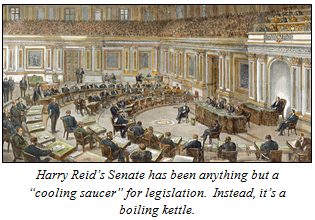Today, the Senate is expected to vote to invoke cloture on the Dodd financial takeover bill, giving new meaning to the “fast track.” Debate on the legislation only began on April 26th, when Senate Majority Leader Harry Reid began a series of votes proceeding to the legislation. And now, less than a month later, final votes on the bill are expected.
Reid at the time seemed to be in quite a rush to get to the bill. In three days, the Majority Leader offered the motion to proceed three times, and three times Republicans defeated it, until they finally relented in allowing the bill to come to the floor. They did so because they said they had achieved a grand compromise that would solve “too big to fail” and eliminate bailouts once and for all, as ALG News has previously reported.
It did neither, and in hindsight, it was a mistake. One that has not significantly improved the bill, and in some cases, has actually made it worse.
An American legend holds that upon his return from France, Thomas Jefferson asked George Washington to justify the establishment of the Senate as they enjoyed breakfast. Washington asked why Jefferson had poured his coffee into his saucer. “To cool it,” said Jefferson. To which, Washington replied, “We pour legislation into the senatorial saucer to cool it.”
So much for that. Yesterday, Americans for Limited Government President Bill Wilson warned that the Senate’s “cooling” role may be history. “Harry Reid and Chris Dodd, with this financial takeover, have turned the Senate from the ‘cooling saucer’ into the boiling kettle pot,” said Wilson. “In just one short month, the so-called ‘most deliberative body’ has considered and will now be voting on the unbridled expansion of federal power to intervene in the economy as never before.”
The bill is indeed punitive, lashing out at the private sector in a manner reminiscent of the Treaty of Versailles. In essence, it assigns full blame for the financial crisis to investors. And, to “pay” for the bailouts, the bill will levy assessments — or reparations — on companies with assets of $50 billion or greater. Like the Weimar Republic after World War I, the companies will not actually pay for the assessments. The people will, as they did in Germany, in this case through higher costs of financial transactions.
But the bill goes further. It will enable the government to seize any company it wants under the pretense of preserving the “financial stability of the United States.” Those companies can then be nationalized, recapitalized (i.e. bailed out), and/or redistributed to favored political entities, just as GM and Chrysler were handed from the bondholders to the UAW. And it will enable an intelligence-like office to monitor every financial transaction, large and small, in the country if it deems it to be necessary.
Making matters worse, the Dodd bill will leave the root, government causes of the crisis completely unaddressed. It will do nothing to rein in Fannie Mae and Freddie Mac, whose reckless sale of over $5 trillion in mortgage-backed securities spread risky loans all throughout the world. Nor will it bring the Federal Reserve to heel, which through lower-than-justified interest rates provided the capital necessary to blow up the housing bubble in the first place.
It will not repeal the Department of Housing and Urban Development’s GSE “affordable housing goals” and Community Reinvestment Act regulations that forced banks to make low-income loans. And it will do nothing to rein in the Federal Housing Administration that lowered down payments on home loans.
So, it will not fix any of the basic policy problems that government had complete control over which contributed to the crisis. Therefore, legislation that might actually help to prevent the government from contributing to another credit bubble once again is not even on the table. In fact, efforts by Senators to rein in Fannie, Freddie, the Fed, and others were all soundly defeated.
The add insult to injury, the Dodd bill will not bring an end to the bailouts that are already in place. The credit lines to Fannie, Freddie, AIG, Citigroup, GM, and Chrysler will all continue.
Leaving the obvious question: What, substantively, has changed about the Dodd bill that a single Senate Republican would dare offer his or her support for the takeover? As Wilson noted, it will “take over the nation’s entire financial sector, institutionalize bailouts for all time, monitor individual finances, and levy unlimited assessments on the American people, all without any votes in Congress nor any recourse to federal courts once company assets are seized.”
In the rush to say it did something about the financial crisis, have well-meaning Senators considered what is in this legislation for the American people? The process that has forced this vote to a head should be rejected, and courageous Senators should vote no on cloture.
It’s time to a take a stand against the pushy politics of Harry Reid, and let the American people decide via the ballot box which way they want to go with financial reform.
Robert Romano is the Senior Editor of ALG News Bureau.


